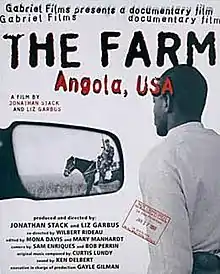The Farm: Angola, USA
The Farm: Angola, USA is a 1998 award-winning documentary set in the notorious and largest American maximum-security prison, Louisiana State Penitentiary, known as Angola. Loosely based on articles published in Life Sentences, drawn from the prison magazine, The Angolite, the film was directed and produced by Jonathan Stack and Liz Garbus. Wilbert Rideau, a life prisoner who had been editor of the magazine since 1975, also participated in direction and was credited on the film.
| The Farm: Angola, USA | |
|---|---|
 | |
| Directed by | Liz Garbus Wilbert Rideau Jonathan Stack |
| Produced by | Liz Garbus Jonathan Stack |
| Written by | Bob Harris |
| Narrated by | Bernard Addison |
| Cinematography | Sam Henriques Bob Perrin |
| Edited by | Mona Davis Mary Manhardt |
| Distributed by | Seventh Art Releasing |
Release date |
|
Running time | 88 minutes |
| Country | United States |
| Language | English |
The film follows the lives of six prison inmates, including Rideau, who tell their own stories of life, death, and survival in a world that few manage to leave. It was filmed during the early years of the long tenure of Warden Burl Cain (1995-2016), who is credited with reducing violence at the prison and establishing many programs to support rehabilitation of the men.
The film was nominated for an Academy Award for Best Documentary Feature.[1] It won the Sundance Film Festival Grand Jury prize, and both the New York and the Los Angeles Film Critics awards for Best Documentary of ‘98. After airing on A&E, it won an Emmy Award.
Years later, Stack followed up with the documentary The Farm: 10 Down (2009), exploring the lives of the survivors of this group 10 years later. One man had been executed and one had died during the making of the first film. Ten years later, three men had gained freedom; two of the first six remained in prison.
| Inmate | Year imprisoned | Sentence | Conviction | Status |
|---|---|---|---|---|
| John A. Brown Jr. | 1986 | Death | First-degree murder and robbery | Executed in 1997[2] |
| George Crawford | 1997 | Life | First-degree murder | |
| Wilbert Rideau | 1961 | Death (commuted to life in 1972) | First-degree murder and kidnapping | Released in 2005 after 4th trial |
| Vincent Simmons | 1977 | 100 years | Two counts of attempted aggravated rape | |
| Eugene "Bishop" Tannehill | 1959 | Life | Second-degree murder and armed robbery[3] | Released by Gov. Kathleen Blanco in August 2007 |
| Logan "Bones" Theriot | 1960 | Life | Murder of wife | Died in prison of lung cancer in 1997[2] |
| Ashanti Witherspoon | 1972 | 75 years | Armed robbery | Paroled in 1999[4] |
Awards
- Sundance Film Festival - Grand Jury Prize, 1998
- Academy Awards - Best Documentary Feature: Nominee, 1999
- Doubletake Documentary Film Festival - Audience Award, 1998
- Emmy Awards - 1999
- Outstanding Achievement in Non-Fiction Programming - Cinematography
- Outstanding Achievement in Non-Fiction Programming - Picture Editing
- Outstanding Achievement in Non-Fiction Programming - Sound Editing: Nominee
- Outstanding Non-Fiction Special: Nominee
- Santa Barbara International Film Festival - Best Documentary, 2000
- Florida Film Festival - Grand Jury Prize, 1998
- San Francisco Film Festival - Golden Gate Award, 1998
- New York Film Critics Circle - Best Non-Fiction Film, 1998
- National Society of Film Critics - Best Non-Fiction Film, 1999
- Los Angeles Film Critics Association - Best Documentary Film, 1999
- Taos Talking Pictures Film Festival - Taos Land Grant Award: Nominee, 1998
- Thurgood Marshall Award, 1999
- Satellite Awards - Best Documentary: Nominee - 1998
References
- "NY Times: The Farm: Angola, USA". NY Times. Retrieved 2008-11-22.
- Ann S. Lewis, "Life and Nothing But", Austin Chronicle, 06 November 1998; accessed 22 May 2017
- "Ex-inmate shares story, hope". Chicago Tribune. Retrieved 2016-12-04.
- "About Me". Ashanti Witherspoon. Retrieved 2016-12-04.